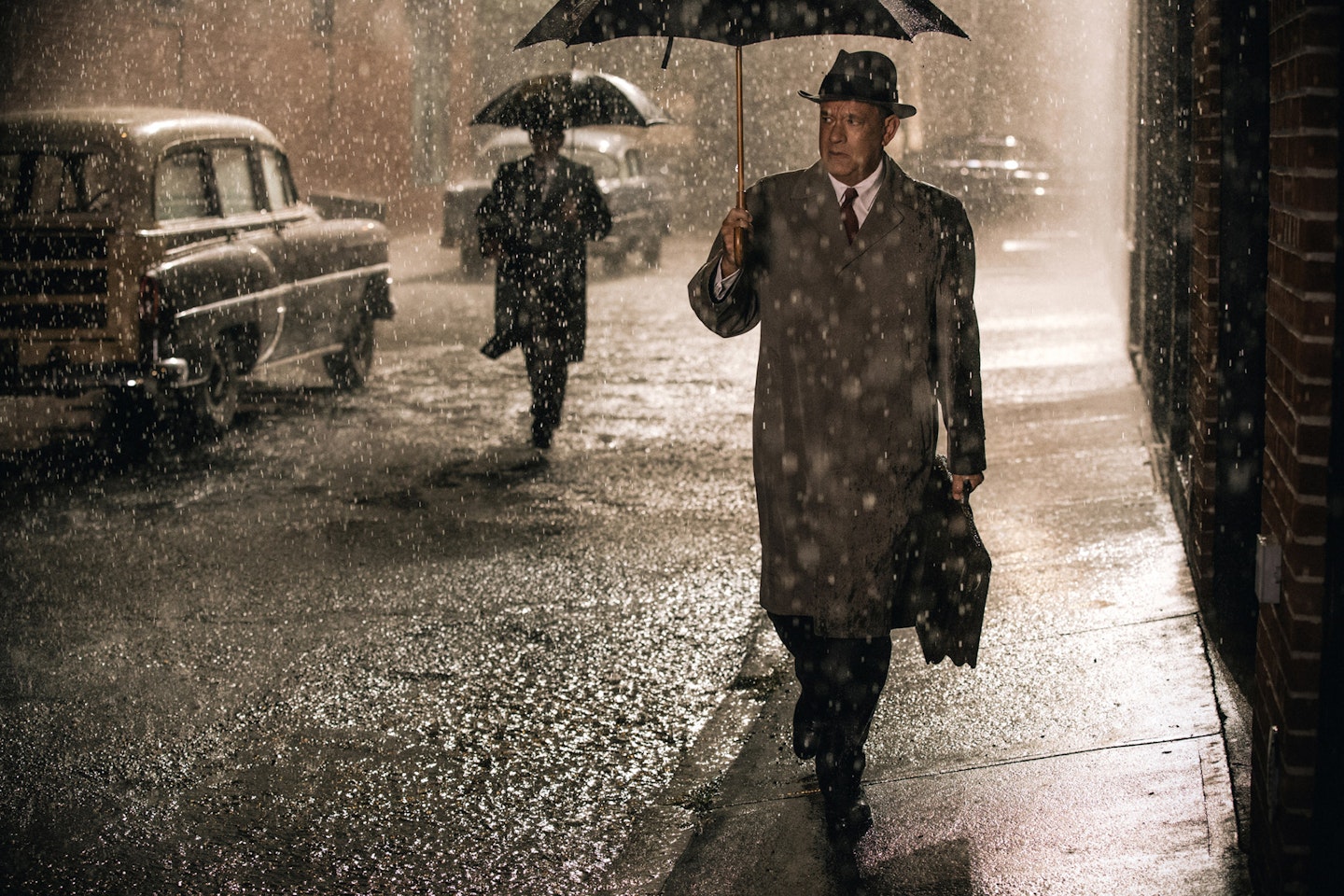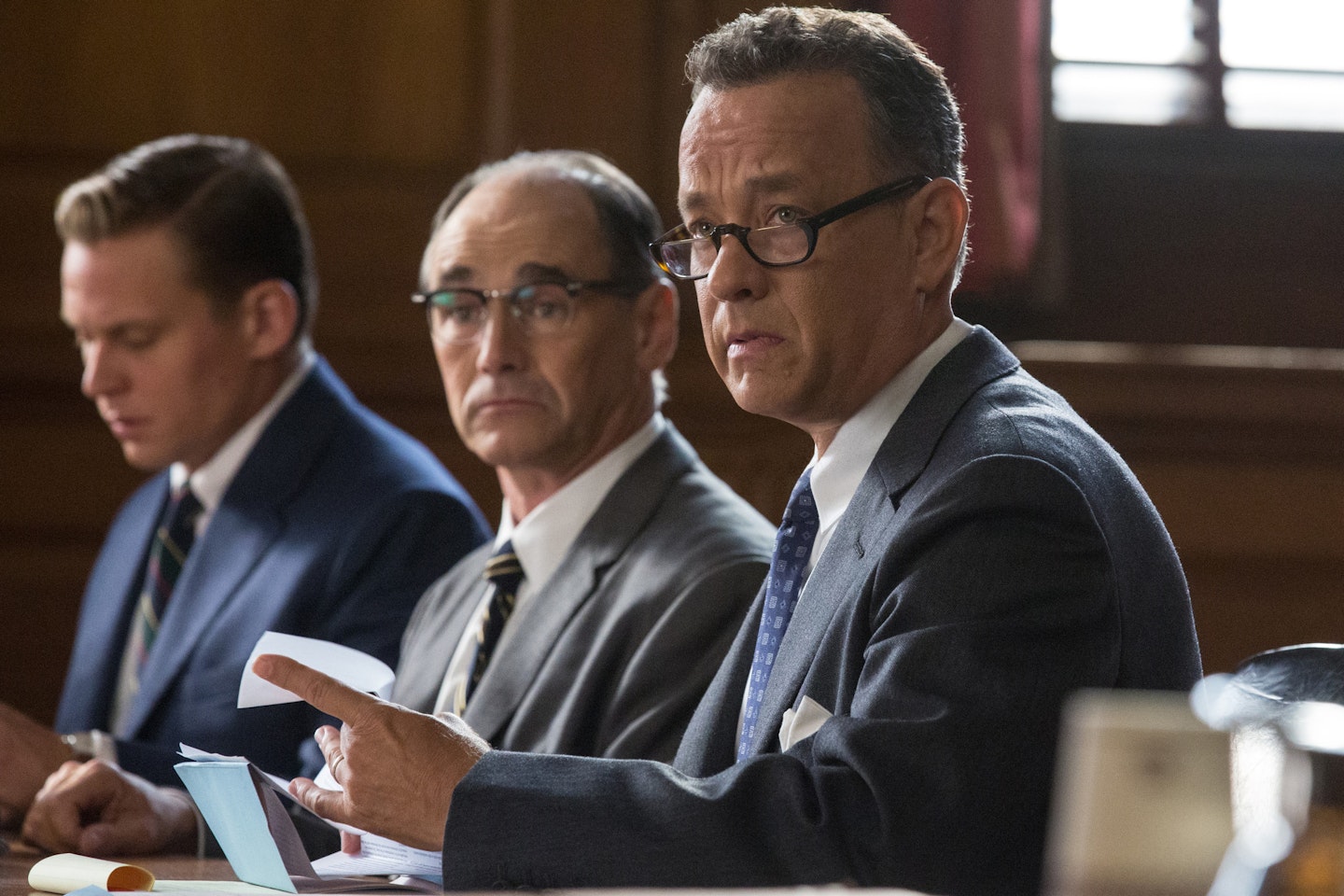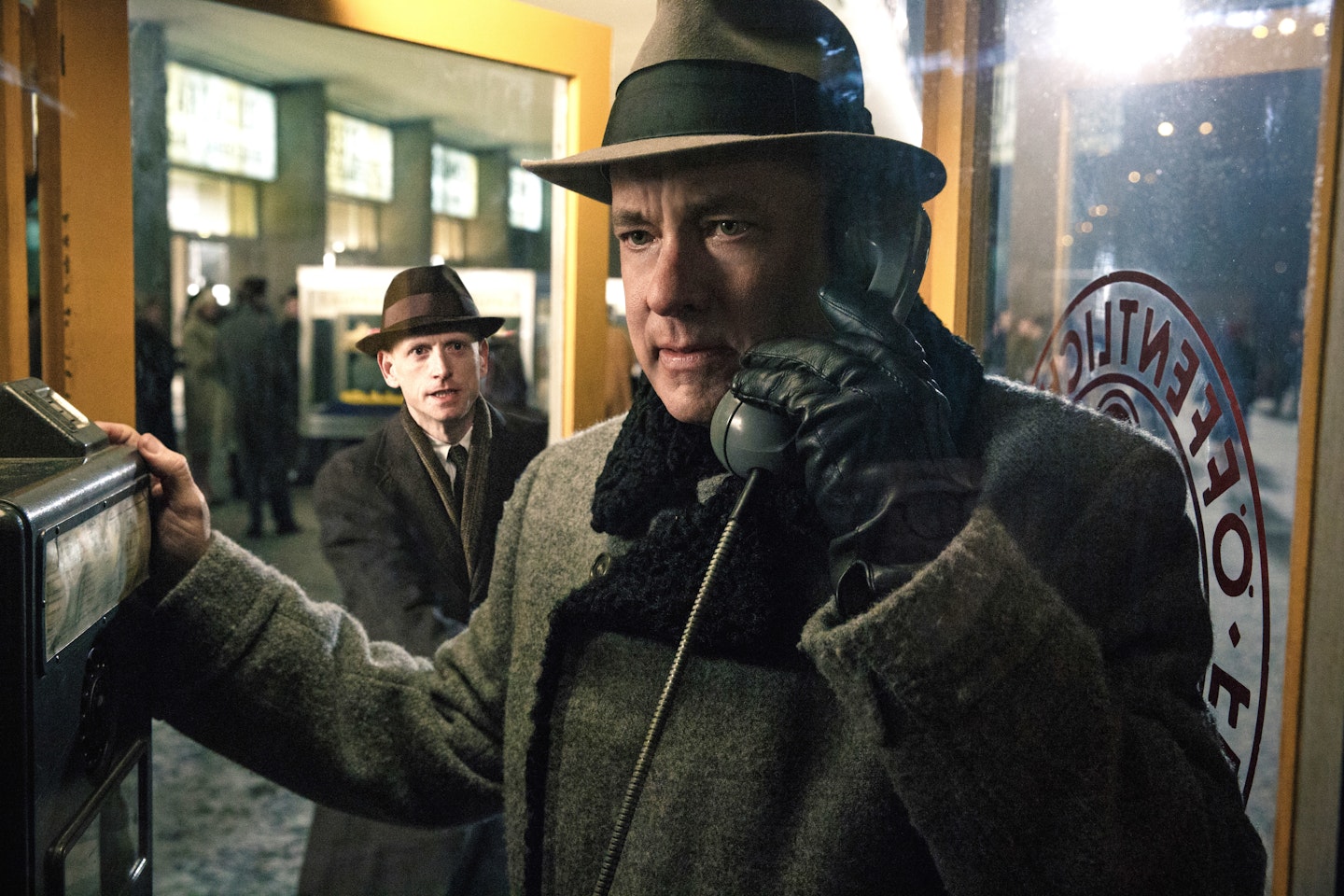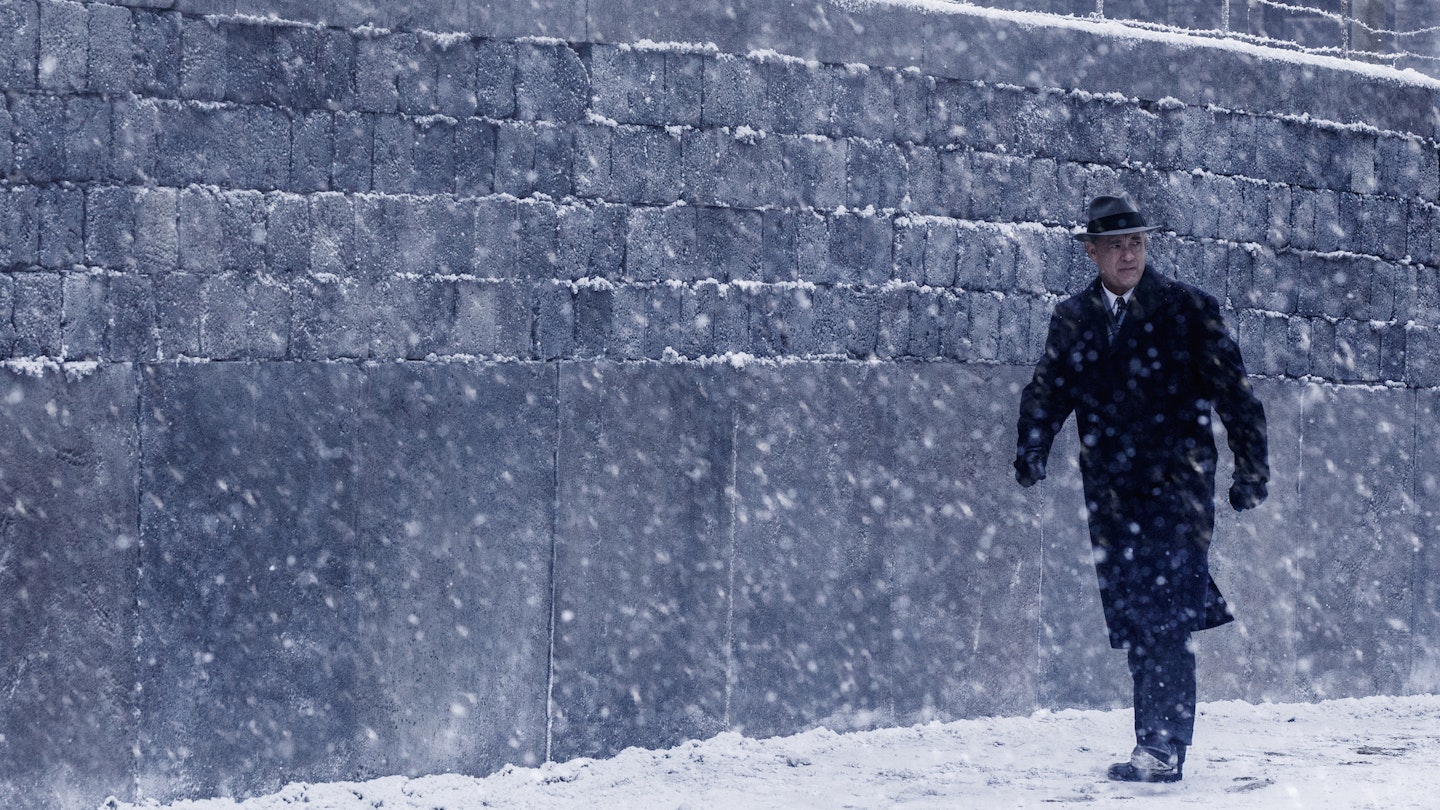Steven Spielberg's excellent Bridge Of Spies reached UK cinemas last week, and Empire was pleased to negotiate the brief capture of its star, Tom Hanks. He stopped by the podbooth to talk us through the Cold War drama, and also took some detours around Toy STory 4 and Joe Dante's cult classic The 'Burbs. The full interview is here for your aural appreciation, but for a quicker fix, here's the transcript, beginning with the notion that Bridge Of Spies takes place at a time when Hanks was only about one year old...
TOM HANKS: No, I was born in 1956. Oh well, actually yeah, the arrest and defense of Rudolf Abel, yeah. I actually think that was before, slightly before I was born. And then we compress everything. Actually we don't specifically say these things happened one after another. We just let time go by without putting up one of those title cards that say four years later. We just took that out.
There are little mentions every now and again – you can hear 1960 being said – but unless you were a particularly prodigious child, I imagine this is something that you learned about much later in life.
Well I was cognizant of the Cuban Missile Crisis when it happened because my parents were talking about it quite a bit. We read about the Cuban Missile Crisis in the newspapers, and I was aware of Nikita Khrushchev proclaiming ‘we will bury you’ at one point. He was talking about economically and intellectually and technologically, but to the mind of a four or five, six-year-old, that means he's gonna dig a hole, throw us in it and put dirt over us.
So the fact is growing up, the Cold War was literally on the news every night. Some comment on ‘Us vs.Them’ was part and parcel of the news media growing up; the discussions in social science classes at school. And the inevitability of a conflict between us and them was discussed all the time. I mean, not just to the point of duck and cover and air raid shelters and, you know, atomic fallout. There was a kind of credence given over to the hypothetical. And there was like, for example... did you have The Twilight Zone over here?

Yeah, we did.
Okay, so there was an amazing Twilight Zone episode that had Charles Bronson and Elizabeth Montgomery and they were veterans, survivors of two opposing armies in a bombed out city that was somewhere in the future. And you thought that they were going to find each other and kill each other. And instead Charles Bronson screamed at her, ‘I don't want anymore of your war; go away!’ And at the end, Charles Bronson has put on a civilian suit and he's wearing a tie without a shirt on. And he walks and he sees the enemy soldier across the street. And it's her. And he doesn't know if he's gonna have to pull out his gun and shoot her. And instead she’s shown coming up from behind a bombed out car and she's wearing a dress.
Star Trek made references to World War III too. And so all the time that I was growing up, this was something that was going to happen. And it was going to happen in our lifetimes. And it was inevitable because Communism said ‘we will take over the world’. So I will say that as soon as I became sort of cognizant of the way the world worked, World War III and Us vs. Them was part of it.
But this story, the specifics of this story Rudolf Abel and James B. Donovan, is that something that you became aware of when the script landed on your desk? Or were you aware of this before?
We were aware, very much knew the story of Francis Gary Powers and the U2 aspect. I knew that he was returned somehow. I knew nothing about James B. Donovan. I knew nothing about Rudolf Abel. I knew nothing about the particulars of it. When I heard that Steven [Spielberg] was talking about doing a Cold War story about Francis Gary Powers, I said, ‘Well, I know who Francis Gary Powers is. What is it gonna be? Is it gonna be, you know, Checkpoint Charlie and phones ringing and guys in fedoras smoking cigarettes?’ And it kind of came out that. But then upon reading it… I did not read Matthew Charman's draft. I'd love to read that. But when I read the Coen Brothers' draft, I was saying, ‘How come I don't know this?’ And very quickly I did a little bit of research and found out really how authentic the story that they were telling was.
This is your fourth collaboration with Steven Spielberg. Does he simply call you and go, ‘Okay, Tom, let's go, me and you, Bridge of Spies, let's make it happen’. Or is the process slightly more involved than that?
Well when there's an actual screenplay involved, I get sort of like a call saying ‘Hey, look, I got this thing and I think it's really interesting.’ And it comes along. Now, it's gonna be tilted in a direction if it's coming from Steven. You might have the natural proclivity to think, ‘Boy, I really hope I like this thing. And I really hope I work it out.’ I will tell you that the four movies that we made, Saving Private Ryan, I never read any version of it that wasn't officially from Steven. For The Terminal, that script had existed and I was working on it with Sacha Gervasi who's the screenwriter. And it had gone to a couple of iterations. And then Steven read it and said he’d really like to do it. So that was the opposite. They were working on Catch Me If You Can with Leo [DiCaprio] and I read the screenplay. I crashed that movie!
You just turned up on set one day...
Well no, what happened was I read it and I knew that Leo was gonna be playing Frank Abagnale and when I read it, the character Carl Hanratty the FBI guy [stood out to me]. I called up and said, ‘Look, I'm not trying to crash anything and I'm not trying to stick my head in this, but you have a part in here that is the equal to Javert in Les Miserables. You can't have a movie called Catch Me If You Can without somebody who is constantly chasing him. I'd like to play who's constantly chasing him.’ So I honed in on that all on my own. So there you have all those various permutations. And Leo gave the okay and Steven let me in. That's how that became the three hander that it was.
In the case of Bridge Of Spies, I heard about it and I didn't do anything and I didn't read it until Steven told me it was great. And we compare notes on all sorts of history anyway. We're always, you know, sending each other photographs or stuff off the internet or we'll have screenings of documentaries that we fall in love with. And that was that. He told me that he was always thinking of me as James Donovan. So hey, man, looks like I got invited to a damn good dance.
In the 10 years between The Terminal and this movie, had you come close to working together again?
Well, we always have had this storytelling bond, because we produced a bunch of long-form television mini-series. They definitely give us a different sort of work dynamic than me being an actor in one of his films. Band of Brothers came about very quickly right after we did Saving Private Ryan, but The Pacific, took three, four, five years to set up. And that means we'd get together and talk about what fascinates us and the story beats that were gonna try to incorporate. So I think I have a working relationship now that is based on sweat and anxiety on my side, because you don't wanna go to work in the morning and have Steven Spielberg disappointed in the work you did. Or somehow regretting the fact that he cast you in it. I actually think I work harder for Steven now than I did the first time.

Take nothing for granted.
You can't. The interesting thing about all the movies that I've done with Steven is that everybody has something fascinating to do. Even the day players: the people who only come in for one day and only work one day. Steven will want them to come in with a great idea. And he will be empowered by stuff that they come in and wanna do. And if you take a look at Bridge Of Spies, which has, you know, a number of friends of mine that were in it from other jobs, I have to say, it's extraordinary that everybody has something interesting to do. No one just comes in, hands over a telegram and then walks out. Everybody has a unique sort of character tidbit that they get to play out. And it makes for the better tapestry of the movie.
It's been a while since you were a day player. If indeed you ever were...
I've had a couple weekly contracts.
Did you show up with ideas?
Oh yeah, you have to. I got together with Mark Rylance before we started shooting and all the guys who played agents. And I said, ‘Guys, this is what I know about the Boss: he will have an idea of where the camera is going to be, but everything else he's looking for is to come. He wants to be inspired by everybody. So let's be armed for bear as the case may be.’
I was lucky that James Donovan wrote as much about his life as he did. He did a very long book about the whole entire case with Rudolf Abel that I got an awful lot of things from, although it's not the major part of the film. I got a lot of the relationship that he had with Rudolf Abel from that. But he also wrote a very microscopic examination of the six days that he was in Berlin negotiating the spy swap. and I got a ton of small little details including the cold. When I came in, I said, ‘You know, Boss, he caught a vicious cold on the plane ride over in an un-insulated, unheated military aircraft. And so for the first four days he was in Berlin, he was miserable.’ And he said, ‘That's great. You'll start with a cold and you'll give Hoffman the cold. He'll have it by the time you go home.’ And so he did, see. That's an example of what he will do with some idea you might have.
How hard is it to convincingly convey a cold on screen?
Well, you know, you gotta go there a little bit. And you have... there's a nasal spray that you just keep pushing. It's not pleasant. But, you know, you work it out; you keep pulling out the handkerchief. It's very hard to fake a sneeze. Fake sneezes are usually an obvious thing.
Coughing's easier, I imagine.
Well yeah, you can always cough. But there's the empty headedness, that kind of thing. I did a little bit, but the sound guys did something extra with the EQ in the mix in order to give me that congested head sound.
There's also something else that really intrigued me. It's just a little character note that I really, really liked, which is that when James Donovan says a number he tends to repeat it. He goes ‘One, one, one’ several times throughout the movie. Did that come from the book?
No, that was the Coens’. That was one of those kind of things that the Coen Brothers bring into it. They write dialogue... the way I describe it is it scans. Almost like literature or, you know, like Shavian dialogue, like George Bernard Shaw or Shakespeare. It has a cadence and it has a logic to it so that every character sounds very different from the other characters. It's not like people have that unified style. And they wrote that. They wrote the ‘one, one, one's and the ‘two, two, two's and the ‘three, three, three's. And I realized that what that is, that's a negotiating skill. That's a tool. That's a trick that he uses in order to win the day or get his point over. And you just run with stuff like that. That's what you look for in a screenplay.
So you still call Steven 'The Boss?'
Or Mon General. El Jefe. I have a lot of nicknames for him. It's funny, because I like to get to the set early. I like to be as ready as I can and get to the set while they're still setting up and with Janusz [Kaminski], his DP, and I now know Mitch Dubin, who's been his camera operator. So four movies, I know a lot of the people he's worked with. And we're all saying, ‘Okay, well, that's about as much as we can do until The Boss gets here. Well let's see what The Boss says about this.’ Because, you know, you're not gonna do anything unless he says so. He is The Boss. The Director's always The Boss. But there's a lot of, you know, ‘Oh Great One’. You can say things like that. ‘Hey, Mr. Smartypants!’ That comes up every now and again. ‘Hey, Mr. Smartypants! You gonna flip a lens or what?’
But you can't go straight in with a Mr. Smartypants. You have to know the man for several years. You can't just...
No, no, you gotta get there. I wouldn't recommend anybody walking in for a first meeting and saying to Steven, ‘Well aren't you Mr. Smartypants?’ I would recommend El Jefe or Oh Great Exalted Leader. You can always try that.

Fair enough. Over the ten years that Steven and you were making movies apart, have there been any roles that you have coveted that he has directed? Lincoln? Indiana Jones?
No, Indiana Jones maybe. No, that's kind of taken. No, but, you know, he actually plays the nature of what he's gonna be doing pretty close to the vest. There has been some stuff that he's sent to me or I've sent to him. But they're just germs of ideas or they're things that are so far down the pike that part of the question is, ‘Well if this becomes something, would you be interested in it?’ And there's some stuff that I take off the table right off the bat. Pardon me, because I'm, you know, my combo plate is pretty full sometimes. But for example, we will be collaborating again on a big mini-series about the air war, and that came about because HBO came back to us and said, ‘Would you guys like to give us another chapter in the sort of Band of Brothers / The Pacific saga?’ And my first question was, ‘Do you really want it?’ And they said, ‘Yeah, it's working out pretty good.’ I said, ‘Well let me talk to The Boss and see what he has to say about it.’ So, you know, we get together and we just begin to start noodling stuff that won't come to fruition for another three or four years.
I can't talk to you without talking about my favorite Tom Hanks film.
Which is?
The 'Burbs.
Oh my Lord, really? The 'Burbs?
It really is.
Interesting little suburban nightmare there.
Yeah.
No, that was fun. That was fun. It was really a story about a guy that should have gone on vacation. That's what I said to Joe Dante at the beginning of it: this is not a story about horrible things, this is a story about a man who should have packed the car and driven away from his house. He's got two weeks off and if he stays home, he's gonna be driven absolutely insane. It was a fun movie, because we made it in the summertime at Universal Studios on the backlot. You know, it's actually became known as Wisteria Lane on Desperate Housewives. Those are literally the same houses that we used for the film. And it was a great group of people. And we laughed an awful lot. And we had split days, where you go into work about noon or 1:00 PM and you shoot during the daylight hours and that's the first half of the day. And the second half of the day is for darkness. And so you have to wait for darkness, so you have about two and a half hours off while they're waiting for the sun to go down. And then you leave about midnight or 1:00 AM in the morning. It's the absolute best way. You get enough sleep. You see your family. You have a nice two hours off about in the middle of the day. And if you're making like a gang comedy, it's awfully good in order to hang out.
There's one thing I wanted to ask you about specifically in The 'Burbs and I don't know if you remember this, but towards the end, after the house has blown up and there's chaos reigns everywhere, you appear at the top of a small flight of steps It's one of the greatest bits of physical comedy I've ever seen. I look at that and I still marvel at it.
I know exactly what you're talking about. I was trying to physicalise the shockwaves that were still going through his head. And the stairs were there and to be quite frank, I don't think I could do that today without twisting an ankle. But I would like to give myself some degree of credit. I think I was so much in the moment of being shell-shocked and being nearly blown up that there: there's this stoop and there's about five or six steps that lead down to the walk and I just kind of like flop my feet down them as opposed to taking any real human step.
Almost like a human slinky in a way. You just slink down them.
Yeah, I was a younger man. I was a younger man and I had stronger calf muscles in those days. But I know exactly what you're talking about. And luckily I only had to do it like three or four times. 'Cause I have a feeling I probably could have done some ligament damage on take eight. But as it was, I think we only had to go up to take four.
What you're doing next? Obviously you're still working on Sully...
Yes, Clint Eastwood is directing me in Sully, which is a story about the pilot who landed the plane on the Hudson and saved everybody's life. I also finished Inferno with Ron Howard, which is another Robert Langdon, Da Vinci Code, Dan Brown story. We shot that in Florence and in Budapest. I did a week on a movie that my company is producing called The Circle that James Ponsoldt directed along with the fabulous Emma Watson. And I did a film about a year and a half ago, based on a Dave Eggers' novel called Hologram For The King with Tom Tykwer who was one of the co-directors of Cloud Atlas and who also did Run Lola Run. So I've got a lot of stuff that has yet to come out.
Busy man. Are you finished on Toy Story 4?
Oh no, Toy Story movies go on and on and on. You go in about every four months and do a little bit more recording and that's now not coming out until 2018. So I'll be working on that for the next two years.
Wow, okay. Is it a rom-com?
Toy Story? I guess... It's a romantic adventure, man. There are some relationship dynamics that go down between Woody and Bo Peep. No lie. Woody and Bo Peep, look for it now!
